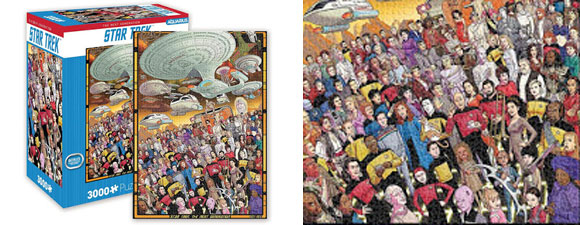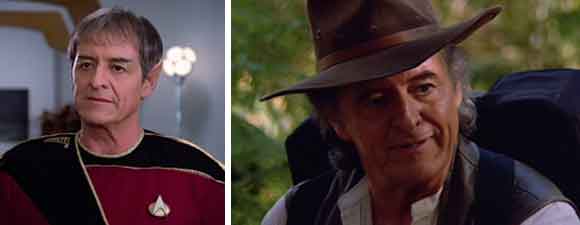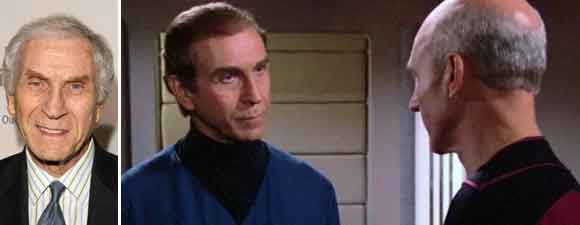Retro Review: Birthright, Part One
7 min readWorf learns from an alien that his father may be alive in a Romulan prison camp, and an experiment causes Data to see visions of his “father” and creator.
Plot Summary: The Enterprise visits Deep Space Nine to consult with Bajoran scientists. While there, Worf is approached on the Promenade by a Yridian who claims that Worf’s father did not die in the massacre at Khitomer but is alive in a Romulan prison camp. Furious, Worf says his father would have died rather than be taken prisoner. Meanwhile, Data assists LaForge and DS9’s Dr. Bashir in examining a recently discovered piece of Gamma Quadrant technology. The device overloads and sends a plasma surge into Data, whose circuits overload, leaving him suspended in a vision where he encounters his creator and “father” Dr. Noonien Soong working as a blacksmith. When LaForge repairs Data’s neural net, Data begins to examine his vision, following Captain Picard’s advice to see if it inspires him to express himself. After painting many illustrations based on the vision, Data seeks out Worf to ask about Klingon vision quests. Worf tells Data that if he has been given an opportunity to learn more about his father, he must follow the vision. Then Worf realizes that this advice applies to himself as well, and demands that the Yridian take him to the prison camp. When he reaches the planet, the Yridian tells him that he must brave the jungle and the Romulan guards alone. When he nears the camp, he meets a a Klingon woman named Ba’el and tells her that he is there to rescue her, but she is confused, replying that this is her home. When a Romulan whom Worf assumes to be a jailer comes to meet her, he follows them. Meanwhile, back on the Enterprise, Data asks Bashir and LaForge to recreate the experiment with the alien device to see whether it will trigger another vision. Reluctantly, they do so, and again Data sees Dr. Soong, who tells Data that he left the programmed image of himself as a blacksmith in case Data ever developed to the point that he could access such cognitive abilities as dreaming. When LaForge repairs his circuits, Data says that he intends to shut down his neural net each day to explore this new capacity to dream. Meanwhile, inside the Romulan compound, Worf grabs an elderly Klingon and demands news of his father, only to be told by L’Kor that his father did die as a warrior at Khitomer. There are nearly 100 Klingons living in the camp, however, and Worf tells L’Kor that he will free them. Several other Klingons sieze and restrain Worf while L’Kor explains that no one is leaving the prison camp…not even Worf.
Analysis: I wasn’t fond of “Birthright” when it aired – it cemented the patriarchal obsession of the Klingons, which wasn’t something that had existed on the original Star Trek. My model for Klingon families had been Kang and Mara, the captain and science officer from “Day of the Dove,” so to have it revealed on The Next Generation that the Duras sisters were second-class citizens because of their gender and that Klingon houses were organized around male ascendancy really enraged me – as if Star Trek didn’t have enough problems with sexism merely from the kinds of roles given to women in Starfleet! Adding a storyline in which Data sees visions of his father just exacerbates things; of course Data hasn’t had any figure standing in the role of mother in the way Soong expressed a wish to be thought of as Data’s father, but we’re looking at a future with one alien raised by humans who’s obsessed with his father without ever mentioning his mother, and an artificially created human obsessed with exploring a fantasy of origin in which a woman plays no role. It all feels rather hostile to women in general and mothers in particular.
That said, I liked the first half of this two-parter better this time around, particularly the Data storyline because I appreciate the prominence dreams and the workings of the unconscious mind are given. When this episode first aired, we’d been given no hint that Julian Bashir’s own parents had tampered with his intelligence and had him artificially enhanced, so it just seemed like a quirk that Bashir should be so interested not in Data’s extraordinary strength or intelligence but in whether his hair grows or he has the appearance of a pulse. Now, though I’m sure it’s just coincidence, it’s actually quite poignant to watch Bashir bond with Dr. Soong’s attempt to create the perfect artificial boy. It’s also nice from a nostalgic perspective to see Bashir bond with the Enterprise crew, and curious that it’s not Crusher and the medical staff but the engineers with whom he ends up working. Data’s efforts to be human have included attempts to mimic sleep, but so far as we know, he’s never believed himself capable of dreaming, so how wonderful to see him awaken from a potentially life-threatening event not unnerved at his near-system shutdown, but eager to understand the mechanics and psychology behind the incident.
Troi is busy dealing with Worf and his father issues, so it’s Picard to whom Data ultimately turns for advice, and Picard suggests not further analysis but a creative approach. I’m not sure he really intended for Data to decide to try to recreate the accident – frankly, I’m astonished that LaForge agreed without asking permission – but directing Data to artistic pursuits ends up being fruitful and fascinating, with Data painting things he has no conscious memory of seeing in his vision. I’m surprised he doesn’t guess that Soong might have left such programming for him, a set of hidden commands should his neural net ever reach a milestone where Soong would have been certain that Data’s positronic circuits could handle the uneven, incomprehensible input of a dreamlike state. The images are wonderful: Soong as a blacksmith forging a bird’s wing, which then turns into a live bird and takes off through the Enterprise corridors, ultimately arriving at the bridge, where Spot is curled up in the captain’s chair while Data rests on a bed surrounded by plants and empty decorative bowls. “Think of it as an empty sky,” Soong tells Data, and then, “You are the bird.” He is offering Data a world of mysticism and spirituality that a younger Data would have dismissed out of hand – irrational, perhaps, but the capacity for exploring and believing in the seemingly irrational is a core aspect of being human.
Worf, on the other hand, seems less and less human as his time on the Enterprise continues. When we first met him, we were told he had been raised since infancy entirely by humans, and in fact had to be taught to mourn like a Klingon by a pair of Klingon outlaws. Now he considers himself something of an expert on Klingon culture, and his own definitions of honor are clearly more rigid than those of Klingons who were raised on the homeworld. When he first learns that his father may be alive, his reaction is horror – he refuses to see past the possible dishonor to himself and Alexander, though the boy was brought up first by a mother and then by grandparents who taught him not to obsess over rigid Klingon standards. When Troi points out that Worf can’t run away from the possibility of seeing his father again, and when Data makes him realize that in fact the experience might have value, Worf decides that it’s at least worth finding out the truth…but he’s going to do it in his own time, using his own standards. Unlike Data, who is fascinated by the fact that while a hammer may symbolize power to a Klingon, it symbolizes sex to a Ferengi and hearth to the Nagori, Worf prefers a single world view…Klingon, by his own standards of what that should mean.
So it’s rather amusing that Worf begins to fall in love with a woman the audience can guess is half-Romulan before he figures it out, and that he marches in intent on rescuing people who don’t believe that they are in need of his assistance and don’t want his involvement. When I first saw this episode, I half-expected that L’Kor was going to turn out to be Mogh, that his declaration that Mogh died in battle would be the story he’d want his son to know. But had that been the case, and had Worf found it out, the show’s writers would have had to stop trying to have it both ways: to make Worf a product of human society as well as Klingon ancestry, yet also to make him a more rigidly honorable Klingon than Gowron, Duras, or any of the other ruling Klingons we’ve met. I wish I could look uber-Klingon Worf, but particularly in this storyline, there seems to be an element of macho arrogance if not misogyny in his obsession with his Klingon aspect. It’s all about the father, the weapons, the hunt, the value placed on strength and stoicism by this hyper-masculine reinterpretation of the Klingons. I feel sorry for Ba’el, who is never going to belong fully in Klingon or Romulan worlds; she looks Klingon yet I can’t help but hope she’ll wish to be a Romulan, where every indication is that women are fully equal in ruling and commanding. Part two of “Birthright” exacerbates those issues, so I’ll save the rest of my comments for next week.






